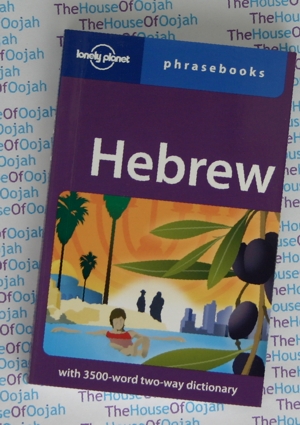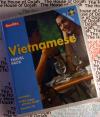Hebrew Phrasebook Lonely Planet

Lonely Planet Hebrew Phrasebook3500 word dictionaryGet Other Hebrew Language Learning Audio and Books click here |
 |
Lonely Planet Hebrew Phrasebookpaperback 140grams Israelis love to chat, so don't be surprised - or caught out - if a total stranger starts up a heated discussion while you wait at a bus stop or felafel stand. An ancient language, Hebrew is the lingua franca of this most cosmopolitan of countries. Whether on a working holiday or on pilgrimage to the Holy Land, this book is an essential companion into the fascinating life of Israel. * guide to festivals & religious events About Modern HebrewIn the Modern Period, from the 19th century onward, the literary Hebrew tradition as pronounced in Jerusalem revived as the spoken language of modern Israel, called variously Israeli Hebrew, Modern Israeli Hebrew, Modern Hebrew, New Hebrew, Israeli Standard Hebrew, Standard Hebrew, and so on. Israeli Hebrew exhibits many features of Sephardic Hebrew from its local Jerusalemite tradition but adapts it with numerous neologisms, borrows (often technical) terms from European languages and adopted (often colloquial) terms from Palestinian Arabic. The literary and narrative use of Hebrew was revived beginning with the Haskalah (Enlightenment) movement of the mid-19th century, with the publication of several Eastern European Hebrew-language newspapers (e.g. HaMagid, founded in Lyck, Prussia, in 1856). Prominent poets were Chaim Nachman Bialik and Shaul Tchernichovsky; there were also novels written in the language. The revival of Hebrew language as a mother tongue was initiated by the efforts of Eliezer Ben-Yehuda (1858-1922) (אליעזר בן–יהודה). He joined the Jewish national movement and in 1881 immigrated to Palestine, then a part of the Ottoman Empire. Motivated by the surrounding ideals of renovation and rejection of the diaspora "shtetl" lifestyle, Ben-Yehuda set out to develop tools for making the literary and liturgical language into everyday spoken language. However, his brand of Hebrew followed norms that had been replaced in Eastern Europe by different grammar and style, in the writings of people like Achad Ha-Am and others. His organizational efforts and involvement with the establishment of schools and the writing of textbooks pushed the vernacularization activity into a gradually accepted movement. It was not, however, until the 1904-1914 "Second aliyah" that Hebrew had caught real momentum in Ottoman Palestine with the more highly organized enterprises set forth by the new group of immigrants. When the British Mandate of Palestine recognized Hebrew as one of the country's three official languages (English, Arabic, and Hebrew, in 1922), its new formal status contributed to its diffusion. A constructed modern language with a truly Semitic vocabulary and written appearance, although often European in syntax and form, especially in phonology, was to take its place among the current languages of the nations. |
Lonely Planet Hebrew Phrasebook |

 0 Items (Empty)
0 Items (Empty)
